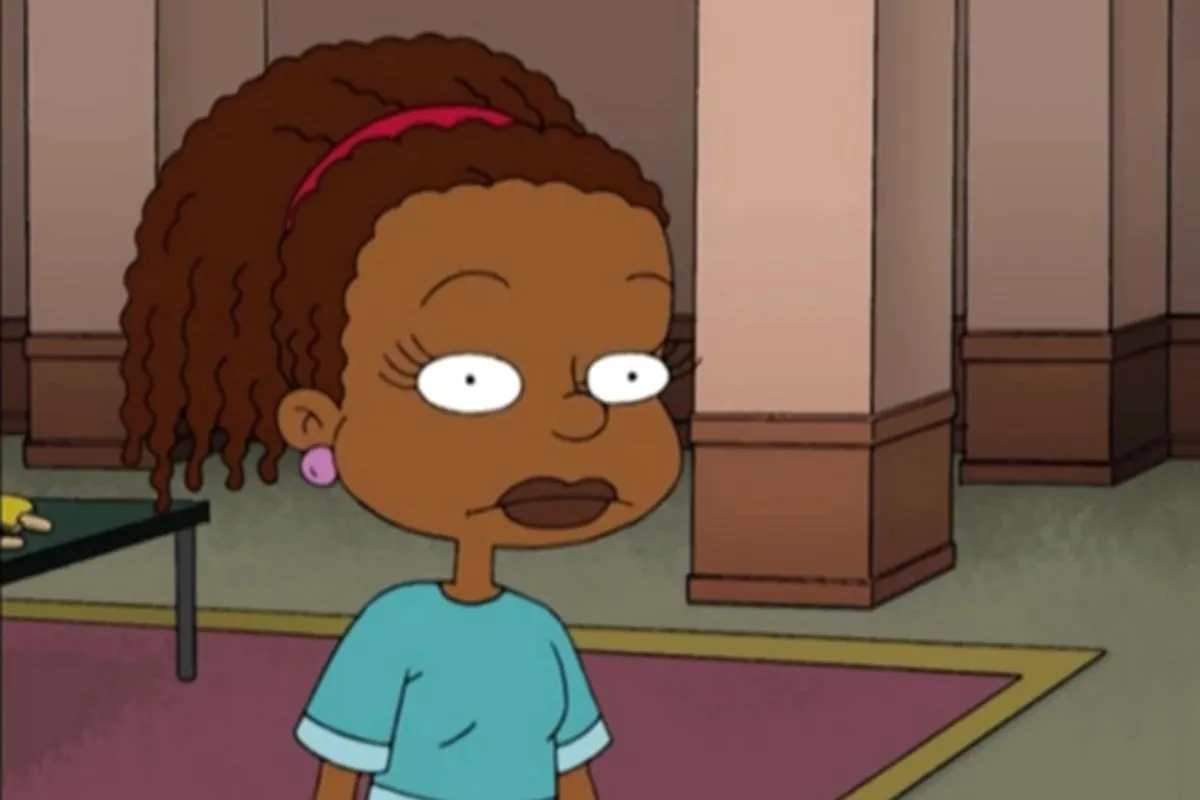Susie Carmichael is a complicated character for me. On the one hand, as a child, I loved her distinct voice (that’s Cree Summer for you!) and her juxtaposition next to Angelica as the lovable, non-adult peacemaker of Rugrats and All Grown Up!. However, the team at Nickelodeon definitely her created as a token Black character. Additionally, they lightened Susie’s skin in later seasons. Despite being nearly perfect in her creation, she also represented the limited scope of Black characters being perfect (which she was nearly) or a “hoodrat.” Harriyanna Hook brought up this limited scope of humanity.
This balance between our society’s idea of perfect and the ideal came up once again when a viral post showing fan art of the Rugrats characters as adults went viral on Twitter. The art had all the characters in monogamous partnerships and with children—except Susie. Here, the artist depicted Susie as the only single parent in the cast.
According to Evie Magazine, the now-deleted Deviant Art post came from 2018. Citing Rugrats All Grown Up! as one of their favorite shows, the student artist @Bearmations wrote a long explanation for their rationale. They explore writing her as widowed but instead went for a different route. They wrote, “She would definitely be strong-willed enough to be so. Susie is a doctor and works hard to support her small family. She is divorced from her ex-husband (Who shall remain nameless).”
While the longer reasoning appears thoughtful and to be out of respect for Susie, it also lacks the social understanding of how racist it is to make the one sole Black character in Rugrats the only single parent. The artist may not have intended for this to be racist, but it was. Not only did it feed into the single-Black mother trope that plagues discourse and public policy, but she was the only one. This was also weird, considering Susie’s family was the most successful in the show’s main cast.
Artists come through with an idealized vision of motherhood
In response to this frustration, artists online began creating a different vision of Susie. In these versions, Susie is not only with a man, but also (mostly) rocking natural hairstyles. (Though there’s nothing wrong with wigs, weaves, and straightened hair.) The FairyArtMother also went on to imagine what Angelica would be doing. The pair may have mostly been at odds with one another, but they are the same age and only one month apart.
Lots of this art is very cis-hetero and doesn’t really show the full imagination of everyone that identified with these characters. But it’s still great to see, specifically because how it compares to the trope of the single Black mother. It’s hard to navigate the internet without seeing people (including our own) harp on about “The Black Family Unit” and demonize Black women. The success of relationships are largely put on women, regardless of race. Though, thanks to de-feminizing tropes thrown at Black women, we’re always the blame. Look no further than people’s anger at Jada when Will Smith smacked Chris Rock.
There’s nothing wrong with being a single mother, regardless of race. However, in America (and really around the world), people see it as a sign of moral failure. Here, it’s a trope of Black and brown women. For many Black parents, proving this stereotype wrong is almost like proving your humanity, and millions of others, because apparently, just being alive isn’t enough. This also includes Black women in the idealized motherhood role that we’ve been largely divorced from (no pun intended) as the caregivers of other people’s children.
A flat conversation with net-positive art
I love seeing the art. However, despite understanding that being partnered and having the 2.5 children that make up the nuclear family (NF) doesn’t define success, nor should it define the ideal American family—it’s hard to divorce myself from the narrative. The NF is one man, one wife and a handful of kids. However, cis-queer people have been able to exist in these structures and found acceptance by wider society as long as the only “arbitration” is parents’ sexuality.
Since the founding of the U.S., the NF has not been accessible to most Black people, whether we want it or not. The institution of slavery and, now, mass incarceration has made this difficult. This means, like many new immigrant families and queer found-families, we rely on wide networks of extended family and non-blood connections as those people we can to lean on and be there for. In terms of kids, adoptive families and single-parent households—all sorts of departures from the NF aren’t “the next best thing” or inherently lesser.
Even very liberal institutions will reinforce the NF as marriage and parenthood get framed and pushed as a matter of “when,” not “if.” The way that framing hits just feels different with this depiction of Susie, because Black people are expected to force themselves into this mold, and this artist made Susie the only single parent. I can’t stress that enough. This remains the reason that these alternatives visions for her still make me smile.
(featured image: Nickelodeon)










Published: Feb 12, 2023 12:58 pm